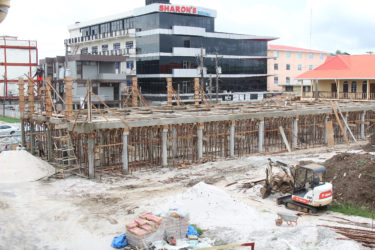The capacity of the justice system is being expanded with the construction of a building to house four new courtrooms in the compound of the Supreme Court.
This is according to Attorney General Basil Williams, who hinted on Thursday that the Land Court could be relocated there.
Asked for information on the construction, which began several weeks ago, Williams said that the building, when completed, will house two land court judges and two high court judges. Questioned about the Land Court, which is located on Brickdam, he said that it is quite possible that it could be entirely relocated to the new building.

At present, the Land Court is located in a building which houses several other offices including the Office of the Ombudsman and the Police Complaints Authority (PCA).
When asked about the opening of Family Court, Williams said that was for the Chancellor to answer.
He said the main element, which is the rules of the court, had already been addressed. He said those rules had been sent over to the Chancellor about a month ago. “I think they are prepared to unveil the court as soon as possible,” he said.
The Family Court, a division of the High Court, will deal with family issues, such as adoption, neglect, child maintenance, custody and domestic violence.
The way was cleared for the Family Court in 2008 and subsequent budgetary allocations were made for the project. Though the building has been completed for some time now, there has been a prolonged delay in the opening of the court.
Night court
Night court, with temporary magistrates, was one of the proposals floated at a meeting last month between the government and the judiciary in the aftermath of the March 3rd fire that claimed 17 lives at the Camp Street prison.
Asked about night courts, Williams said that this is directly related to the overcrowding in the prisons and will be designed to address that. He said it is hoped that the part-time magistrates who will be hearing the matters will be able to substantially address the overcrowding by reducing the backlog of cases that exist.
Asked if new legislation will be needed to make these courts functional, he responded in the negative. He said the normal court would end around 3 pm and the night court would start at least an hour later.
Public Security Minister Khemraj Ramjattan had told [the Government Information Agency] that the idea of temporary magistrates was put forward by Chancellor (ag) Justice Carl Singh during the recent high level meeting. He said the Chancellor suggested that this measure be used over a period of at least six months.
Ramjattan stated that a recent report on the judicial system has been completed and this would form the basis for action. He disclosed that the report also looked at prisoners who could be given probation or community service for less severe sentences.
The minister added that the temporary magistrates would be qualified lawyers, who would serve in addition to the sitting magistrates.





